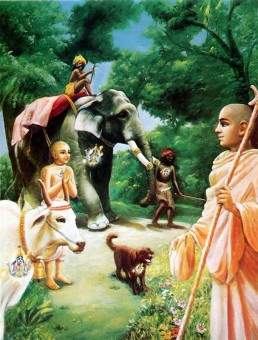The foregoing stanza might give to an unprepared student, the idea that spiritual life is a static existence where a baked, stony heart, vainly comes in contact with the heart-throbs in the world of objects, and feels for itself nothing but a monotonous equanimity. In that case a majority of us, without much discussion, can take our hats off and say “goodbye” to all spirituality immediately. For, who can deny the fact that the world, as it is constituted to-day, in spite of its imperfections, when it comes in contact with our own inner world, however maladjusted the inner world may be, can and does give minute flashes of joy? Why should I deny myself the brilliant flashes of momentary joys in exchange for a steady stone-like, impregnable monotony, call it equilibrium or equanimity, peace or God-hood? By changing the name, the thing itself is never changed!
This doubt is not a mere exaggeration. This is often heard in the halls of Vedanta from the lips of all sincere seekers. Any sensible seeker entering the halls of spiritual study with his intellect bright and clear, should come to doubt its efficacy and utility. No teacher can afford to ignore answering these questions and re-assuring the students; Krishna, as a professional teacher, is doing the same in this stanza.
THE ONE WHO HAS GAINED COMPLETE DETACHMENT FROM THE EXTERNAL OBJECTS, REALISES THE BLISS THAT IS THE NATURE OF THE SELF. Though the process of self-development is essentially a process of detachment, this technique of negation does not take us to an empty and purposeless zero, but when we have negated all that is false, we come to experience and live a total positivity. When the dreamer has renounced all his contacts with the dream-world and thrown away his dream personality, he does not become a non-entity, but he re-discovers himself to be the more vital, the more effective personality, the waker.
Similarly, whenever contacts with the external world through the media of the body, the mind and the intellect are clipped off clean, we awaken in the meadows of God-consciousness and come to live the joy that is the eternal nature of the Self. A seeker having thus redeemed his own mind and intellect from their preoccupations with the external world, at least during his meditation, when he comes to keep his HEART DEVOTED TO THE MEDITATION OF Brahman, attains imperishable happiness. Here the term “heart” is to be understood as a collective name for the inner instruments of knowing and experiencing.
FOR THE FOLLOWING REASONS ALSO HE SHOULD WITHDRAW THE SENSES FROM THE EXTERNAL WORLD-OF-OBJECTS:

